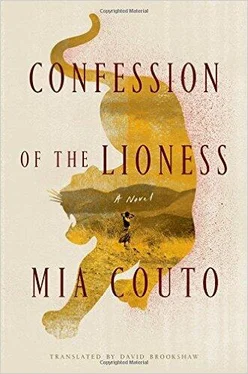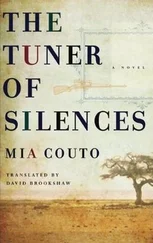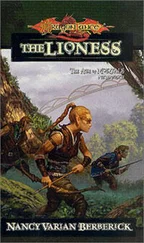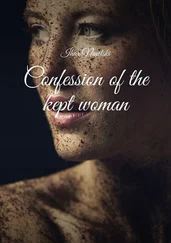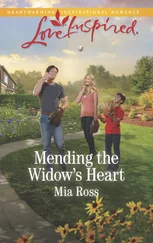More or less.
There’s no more or less when it comes to guns and freedom. Have you ever seen anyone get killed?
Never. And you? Have you ever killed someone, or has it always just been animals?
I am immediately struck by the memory of my father swimming in blood that wasn’t just his own, but that of all the Bullseyes. My words are rendered more somber by my solemn tone. Those we have killed, no matter whether they are strangers to us or our enemies, become members of our family forever after. They never leave us, but remain more present than the living.
* * *
Returning to our company once more, Dona Naftalinda smiles, amused by the way the writer shakes the dust from himself as if in some act of self-flagellation.
See the advantage of being a lion? A lion never gets himself dirty , Dona Naftalinda asserts.
All I want is a bath. I’ve got more dust on me than I have clothes , Gustavo complains, shaking himself vigorously.
So much the better , I advise him in a sarcastic tone. You’re much better off like that because your body will begin to get used to the land. Get used to being part of the land, belonging to this land.
I am of this land.
Only the land can confirm that.
I turn my back and walk away, though not before I hear the writer mutter angrily to himself:
Arrogant bastard!
* * *
When we get back to the car, the administrator hurries to inspect our cargo: Ten goats are squeezed into the baggage compartment. The creatures appear calm, displaying the stupid good humor of ruminants.
Wouldn’t it be better to tether them? Dona Naftalinda asks.
The goats had spent the whole journey standing, balancing themselves with professional skill, like a troupe of dancers. Florindo comments proudly: A goat was made to ride in a car, it can keep its balance even over an abyss, where there’s no longer any ground. Then the administrator opens his arms in a gesture of friendship:
Don’t forget, Comrade Hunter: One of these animals is for you to use as bait for the lion. Choose the one you want.
There must be some mistake here, my dear administrator. A number of mistakes, for that matter: In the first place, I’m not your comrade. But what’s more important is the fact that I don’t hunt with bait. I’m a hunter, not a fisherman.
Do as you wish. But the truth is this: Whether you’re fishing or hunting, you’ve got to eliminate these lions. It’s one of my political objectives.
The eaters of people are a political matter as far as he is concerned.
My superiors , he reminds us emphatically, gave very clear instructions: The people have the vote, animals don’t. The reason behind this community’s complaints must be eradicated. And he repeats his perfunctory order: You’ve got to kill them.
I won’t kill them. Of that you can be sure , I reply.
What’s that you’re saying?
I’m a hunter. I don’t kill, I hunt.
Isn’t that the same thing, surely?
For you, it may be. For me, it’s completely different. But let me say one thing before we get to the village. I wasn’t recruited by the administration. My only obedience is to whoever is paying me.
* * *
We set off again on our journey, and all of a sudden a cloud of dust once more disturbs the timeless peace of the savanna. The administrator realizes he should retreat from his confrontation with me. The presence of a well-known writer is a unique opportunity for him to polish his image. In an offhand way, he affirms, as if he were thinking out loud:
Whether you’re killing or hunting, what’s important is that people can return to their daily activities. In their struggle to overcome absolute poverty.
The man is no longer talking. He’s giving a speech. And he declares that the expedition, led by his party, will save people condemned to poverty. He uses that grand word: “save.” In the car mirror, I watch the dust disperse and I’m overcome by a gentle drowsiness: How I’d like to be saved! How I’d like to wallow, like a drowning man, in the arms of a savior. Or, to be more precise: in Luzilia’s arms.
* * *
When you go hunting, I’ll go with you, Comrade Archie , the administrator declares.
In hunting, no one goes with anyone , I reply. In hunting, there are only two creatures: the one who kills and the one who dies.
I need my people to see me, to see me returning to the village with the trophy.
At last, some houses come into view.
Not long now , Naftalinda tells the writer, and people will come out onto the road in their droves.
Those aren’t people living in those houses , the administrator clarifies.
They’re not people living there? Gustavo asks. Who lives there, then?
It’s fear that lives there , he replies.
* * *
Nine hours after leaving Pemba, the capital of the province, our delegation arrives at the village. The administrator was right. But it’s not just fear that inhabits Kulumani. Terror is etched into the faces of the crowd that surrounds us.
Don’t stop the vehicle in the middle of the road , Makwala orders.
I smile. The road is so narrow that it has no middle. Nor does it have shoulders: Everything on either side has gained the color of dust. I too am so covered in dust that it’s as if my body is the same on the inside and the outside. I shake myself down, and my hands are clouds that seem to have migrated from my body. My chest is shaken by a fit of coughing. Some nebulous entity seems to be taking charge of me.
* * *
Unaware of all this, a sea of people envelops us. The administrator’s wife whispers an explanation in my ear: All the country folk from the surrounding villages have been mobilized to come and welcome us. Defying all the rules about safety, these villagers will march back to their homes at night. But it all seems inevitable: A chief’s strength is measured by the welcome he’s given. And Florindo Makwala doesn’t want to pass up a chance to impress us. He doesn’t allow the credits to escape him as he openly encourages Gustavo Regalo:
See, my dear Regalo? The people love us. Me and my party. Write all this down, take photos of it all.
In the middle of the throng someone grabs my arm. I reciprocate, clumsily shaking his hand. Then I notice that he’s blind. It was his stray gesture that collided with me and caused me to stop in my tracks. He’s wearing camouflaged military fatigues that stand in contrast to his bare feet.
You people have arrived! the blind man exclaims, as if we were fulfilling our destiny. And then he proclaims: You have come to shed your blood in Kulumani.
All of a sudden I give in to a strange impulse and start waving at the crowd. I remember other occasions when I’ve been received as a savior. But these people are looking at me obliquely. The blind man’s clammy hand seizes my arm once again:
Have you brought a rifle? What for? These lions aren’t going to be killed with a bullet.
The vigor with which he pursues me makes me doubt the truth of his blindness. My suspicion grows stronger when he grabs me with the despair of one struggling for breath and asks me:
Can you see me?
Why do you ask?
No one can see us, the people of Kulumani, only the muwavi , the witch doctors, pay us any attention.
The administrator helps free me from the blind man’s intrusiveness. He pushes me to the front of the vehicle, where the headlights have opened up a patch of light, and whispers:
Читать дальше
